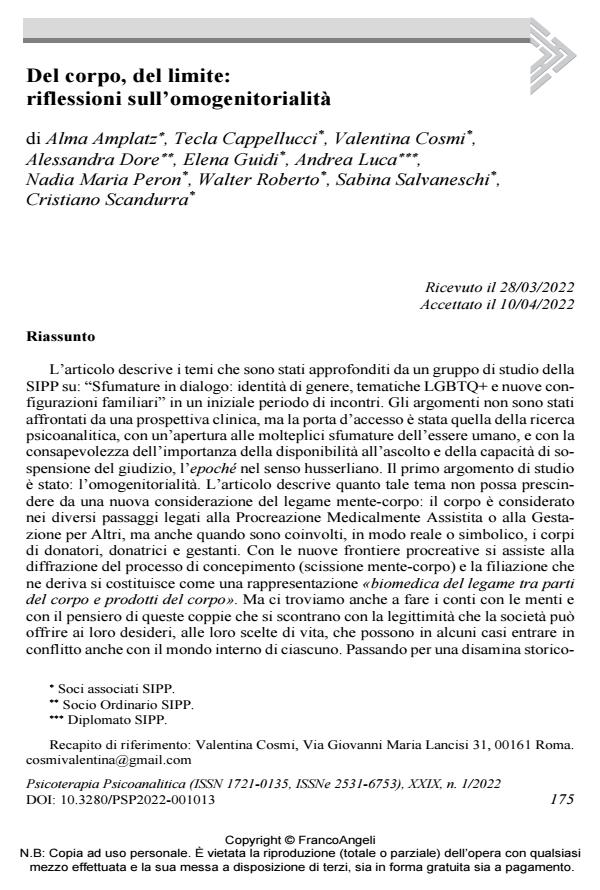Del corpo, del limite: riflessioni sull’omogenitorialità
Titolo Rivista PSICOTERAPIA PSICOANALITICA
Autori/Curatori Alma Amplatz, Tecla Cappellucci, Valentina Cosmi, Alessandra Dore, Elena Guidi, Andrea Luca, Nadia Maria Peron, Walter Roberto, Sabina Salvaneschi, Cristiano Scandurra
Anno di pubblicazione 2022 Fascicolo 2022/1
Lingua Italiano Numero pagine 14 P. 175-188 Dimensione file 225 KB
DOI 10.3280/PSP2022-001013
Il DOI è il codice a barre della proprietà intellettuale: per saperne di più
clicca qui
Qui sotto puoi vedere in anteprima la prima pagina di questo articolo.
Se questo articolo ti interessa, lo puoi acquistare (e scaricare in formato pdf) seguendo le facili indicazioni per acquistare il download credit. Acquista Download Credits per scaricare questo Articolo in formato PDF

FrancoAngeli è membro della Publishers International Linking Association, Inc (PILA), associazione indipendente e non profit per facilitare (attraverso i servizi tecnologici implementati da CrossRef.org) l’accesso degli studiosi ai contenuti digitali nelle pubblicazioni professionali e scientifiche.
L’articolo descrive i temi che sono stati approfonditi da un gruppo di studio della SIPP su: "Sfumature in dialogo: identità di genere, tematiche LGBTQ+ e nuove configurazioni familiari" in un iniziale periodo di incontri. Gli argomenti non sono stati affrontati da una prospettiva clinica, ma la porta d’accesso è stata quella della ricerca psicoanalitica, con un’apertura alle molteplici sfumature dell’essere umano, e con la consapevolezza dell’importanza della disponibilità all’ascolto e della capacità di sospensione del giudizio, l’epoché nel senso husserliano. Il primo argomento di studio è stato: l’omogenitorialità. L’articolo descrive quanto tale tema non possa prescindere da una nuova considerazione del legame mente-corpo: il corpo è considerato nei diversi passaggi legati alla Procreazione Medicalmente Assistita o alla Gestazione per Altri, ma anche quando sono coinvolti, in modo reale o simbolico, i corpi di donatori, donatrici e gestanti. Con le nuove frontiere pro-creative si assiste alla diffrazione del processo di concepimento (scissione mente-corpo) e la filiazione che ne deriva si costituisce come una rappresentazione «bio-medica del legame tra parti del corpo e prodotti del corpo». Ma ci troviamo anche a fare i conti con le menti e con il pensiero di queste coppie che si scontrano con la legittimità che la società può offrire ai loro desideri, alle loro scelte di vita, che possono in alcuni casi entrare in conflitto anche con il mondo interno di ciascuno. Passando per una disamina storico-filosofica del concetto mente-corpo nonché di limite, si è giunti ad alcuni interrogativi attuali: le tecnologie di fecondazione assistita rappresentano un ulteriore passo per una scissione mente-corpo o una delle tante espressioni di un sano progresso umano? Dove va a finire nella visione classica dell’Edipo il corpo sessuato? Quanto i termini, materna e paterna, appaiono ancora oggi adeguati?
Parole chiave:legame mente-corpo, limite, complesso edipico, procreazione medicalmente assistita.
Alma Amplatz, Tecla Cappellucci, Valentina Cosmi, Alessandra Dore, Elena Guidi, Andrea Luca, Nadia Maria Peron, Walter Roberto, Sabina Salvaneschi, Cristiano Scandurra, Del corpo, del limite: riflessioni sull’omogenitorialità in "PSICOTERAPIA PSICOANALITICA" 1/2022, pp 175-188, DOI: 10.3280/PSP2022-001013